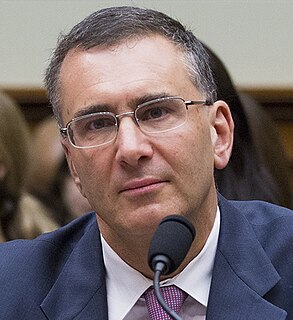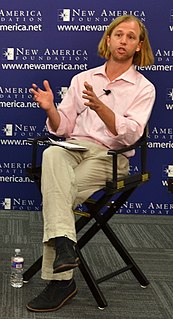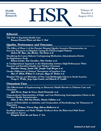Related Research Articles

TheHoover Institution, officially TheHoover Institution on War, Revolution, and Peace, is a conservative American public policy think tank and research institution that promotes personal and economic liberty, free enterprise, and limited government. While the institution is a formal unit of Stanford University, it maintains an independent board of overseers and relies on its own income and donations.

James Bradford "Brad" DeLong is an economic historian who is a professor of economics at the University of California, Berkeley. DeLong served as Deputy Assistant Secretary of the U.S. Department of the Treasury in the Clinton Administration under Lawrence Summers.

The Harvard T.H. Chan School of Public Health is the public health school of Harvard University, located in the Longwood Medical Area of Boston, Massachusetts. The school grew out of the Harvard-MIT School for Health Officers, the nation's first graduate training program in population health, which was founded in 1913 and then became the Harvard School of Public Health in 1922.

Jonathan Scott Cohn is an American author and journalist who writes mainly on United States public policy and political issues. Formerly the executive editor of The American Prospect and a senior editor at The New Republic, Cohn is now a senior national correspondent at The Huffington Post.

Ezra Klein is an American journalist, political analyst, New York Times columnist, and the host of The Ezra Klein Show podcast. He is a co-founder of Vox and formerly served as the website's editor-at-large. He has held editorial positions at The Washington Post and The American Prospect, and was a regular contributor to Bloomberg News and MSNBC. His first book, Why We're Polarized, was published by Simon & Schuster in January 2020.

Jonathan Holmes Gruber is an American professor of economics at the Massachusetts Institute of Technology, where he has taught since 1992. He is also the director of the Health Care Program at the National Bureau of Economic Research, where he is a research associate. An associate editor of both the Journal of Public Economics and the Journal of Health Economics, Gruber has been heavily involved in crafting public health policy.

Justin James Michael Wolfers, born in 1972, is an Australian economist and public policy scholar. He is professor of economics and public policy at the Gerald R. Ford School of Public Policy at the University of Michigan, and a Senior Fellow at the Peterson Institute for International Economics.

David Leonhardt is an American journalist and columnist. Beginning April 30, 2020, he writes the daily "The Morning" newsletter for The New York Times. He also contributes to the paper's Sunday Review section. His column previously appeared weekly in The New York Times. He previously wrote the paper's daily e-mail newsletter, which bore his own name. As of October 2018, he also co-hosted a weekly Opinion podcast titled "The Argument", with Ross Douthat and Michelle Goldberg.

Kevin Werbach is an American academic, businessman and author. In 2002, he founded the Supernova Group, a technology analysis and consulting firm. Since 2004, Werbach is an Associate Professor of Legal Studies and Business Ethics at The Wharton School, University of Pennsylvania. He writes about business, policy, and social implications of emerging Internet and communications technologies.
The public health insurance option, also known as the public insurance option or the public option, is a proposal to create a government-run health insurance agency that would compete with other private health insurance companies within the United States. The public option is not the same as publicly funded health care, but was proposed as an alternative health insurance plan offered by the government. The public option was initially proposed for the Patient Protection and Affordable Care Act, but was removed after independent Connecticut senator Joe Lieberman threatened a filibuster. Subsequently, Congress did not include the public option into the bill passed under reconciliation. The public option would later be supported by Hillary Clinton and the Democratic Party in the 2016 and 2020 elections and multiple other Democratic candidates, including the current President Joe Biden.
A health insurance mandate is either an employer or individual mandate to obtain private health insurance instead of a national health insurance plan.

Megan McArdle is an American journalist, columnist, and blogger based in Washington, D.C. She writes for The Washington Post, mostly about economics, finance, and government policy.

Health Services Research is a peer-reviewed healthcare journal published bimonthly by Wiley-Blackwell on behalf of the Health Research and Educational Trust. In addition, it is an official journal of AcademyHealth. The editor-in-chief is Austin Frakt. The journal covers research, methods, and concepts related to the financing, organization, delivery, evaluation, and outcomes of health services.

The Oregon health insurance experiment was a research study looking at the effects of the 2008 Medicaid expansion in the U.S. state of Oregon, which occurred based on lottery drawings from a waiting list and thus offered an opportunity to conduct a randomized experiment by comparing a control group of lottery losers to a treatment group of winners, who were eligible to apply for enrollment in the Medicaid expansion program after previously being uninsured.

Vox is an American news and opinion website owned by Vox Media. The website was founded in April 2014 by Ezra Klein, Matt Yglesias, and Melissa Bell, and is noted for its concept of explanatory journalism. Vox's media presence also includes a YouTube channel, several podcasts, and a show presented on Netflix. Vox has been described as left-wing and progressive.
Austin B. Frakt is a health economist who holds positions with the Department of Veterans Affairs, Boston University, University of Pennsylvania and Harvard. He is widely known as the founder and co-editor-in-chief of The Incidental Economist. His academic research has been published in major academic journals such as the New England Journal of Medicine and Health Affairs. Frakt supports the use of mainstream media as a means of translating academic research into policy relevance and has contributed to outlets including The New York Times and Bloomberg News. He serves on editorial boards of the academic journals Health Services Research and The American Journal of Managed Care and is a member of the New England Comparative Effectiveness Public Advisory Council.
Aaron Edward Carroll is an American pediatrician and professor of pediatrics at Indiana University School of Medicine. At Indiana University, he is also the Vice Chair for Health Policy and Outcomes Research and the Director of the Center for Health Policy and Professionalism Research.

Ashish Kumar Jha is an Indian-American general internist physician and academic serving as the White House Coronavirus Response Coordinator. He is currently on a short-term leave from the Brown University School of Public Health where he served as the Dean. Prior to Brown, he was the K.T. Li Professor of Global Health at Harvard T.H. Chan School of Public Health, faculty director of the Harvard Global Health Institute, and a Senior Advisor at Albright Stonebridge Group. Jha is recognized as one of the leading health policy scholars in the nation. Jha's role at Brown University focuses on improving the quality and cost of health care, and on the impact of public health policy.

The Executive Order Promoting Healthcare Choice and Competition, also known as the Trumpcare Executive Order, or Trumpcare, is an Executive Order signed by Donald Trump on October 12, 2017, which directs federal agencies to modify how the Patient Protection and Affordable Care Act of the Obama Administration is implemented. The order included a directive to federal agencies to end rules forbidding employers from using health reimbursement arrangements (HRAs) to pay individual insurance premiums.
References
- ↑ E.g. Klein, E. (2009). Letters to health-care Santa: Bring the market to Medicare Advantage, and the House's employer mandate to the final bill. The Washington Post. December 22.
- ↑ E.g. Drum, K. (2010). Is health insurance good for you? Mother Jones. February 15.
- ↑ E.g. Cohn, J. (2010). Give me insurance or give me death. The New Republic. February 16.
- ↑ E.g. Sullivan, A. (2010). Pass. The. Damn. Bill. The Atlantic. February 1.
- ↑ See the blog's Selected Citations page for additional citations of note.
- ↑ Levins, Hoag (March 21, 2014). "Austin Frakt to Write for New York Times". Leonard Davis Institute of Health Economics. University of Pennsylvania. Retrieved March 24, 2014.
- ↑ About Austin
- ↑ About Aaron
- ↑ " @onceuponA " on Twitter
- ↑ About Adrianna
- ↑ About Kevin
- ↑ About Harold
- ↑ About Bill
- ↑ About Nicholas